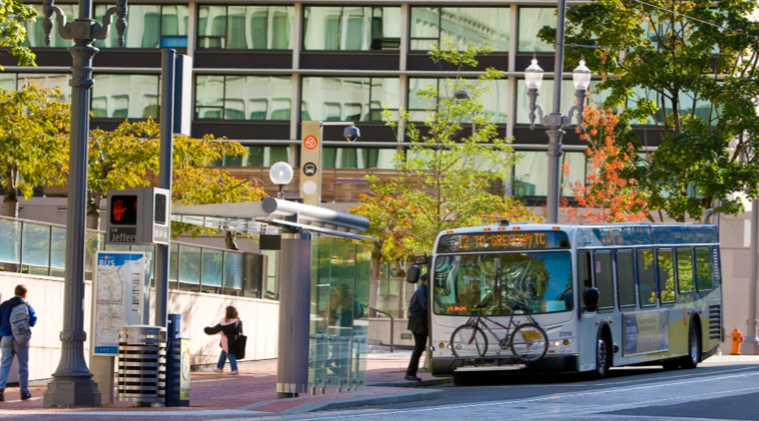The Green New Deal must include a major reform of how the federal government funds, maintains and expands transit, an advocacy group said this week.
In an effort to finally put some meat (er, soy protein) on the bones of the much-talked about but ultimately thin ecology program, TransitCenter put forward a four-point agenda to build on the narrow transit strategy in the initial Green New Deal trial balloon announced in February by Rep. Alexandria Ocasio-Cortez (D-N.Y.) and Sen. Ed Markey (D-Mass.). That announcement called only for increased investment in "affordable and accessible public transportation; and high-speed rail.”
The recommendations from TransitCenter are a long way from being adopted, of course, says organization spokesperson Ben Fried.
"We’re just at the beginning of these conversations," said Fried. "The specifics that are lacking would take shape, I would hope by the time of the next presidential election. The spirit of it is to state the ambition first and use that to launch into the more concrete policy. The next step is to turn that into more concrete policy ideas that could be plugged into federal legislation."
Here's the essence of TransitCenter's proposal, which was published on the blog of the left-wing think tank Data for Progress:
More money for transit, less for highways
Current funding formulas dedicate 80 percent of federal surface transportation funding to highways and 20 percent to transit. TransitCenter recommends shifting the formula, though the group did not set specific numbers.
In addition, the organization calls for changing how federal funding is applied. Right now, federal transit funds can only be spent on capital expenses like new tracks or buses. TransitCenter instead recommends allowing transit agencies to spend money on actually running more buses or trains — because service frequency is one of the greatest drivers of ridership.
In order to prevent transit agencies from offloading their operating costs entirely on the feds, the two groups propose making federal funds for operating available only as matching funds, when equal funding is provided by local entities.
Build sidewalks, not walls
Good transit depends on save ways for people to access bus stops. But right now, federal policy makes it nearly impossible for transit agencies to allocate funds to improve accessibility.
"Agencies shouldn't have to apply for sidewalk funds from an alphabet soup of tight-fisted federal programs," the TransitCenter proposal states. "If the feds gave state DOTS a free and easy hand to build highways for the past 60 years, they can finally do the same for local transit agencies and sidewalks."
No environmental review for transit projects
Minor transit improvements, such as creating dedicated new bus lanes, are inherently good for the environment and therefore should not be subject to lengthy regulatory review processes, TransitCenter says.
"The federal government already exempts certain types of projects, like bike lanes, from environmental review," the report stated. "These exemptions should be expanded to include simple transit-priority projects."
No more highway expansions
Expanding highways is antithetical to the goal of reducing carbon emissions. But the federal government spent about $40 billion in 2018 on roads and highways.
Data for Progress and TransitCenter recommend redirecting this funding to cities and regional planning agencies rather than highway-focused state departments of transportation. Localities and regional planners should be instructed to invest in projects that reduce driving miles.
Where traffic congestion is a serious problem, it should be managed with pricing schemes, like variable tolls, or bus-only lanes, TransitCenter recommends.






